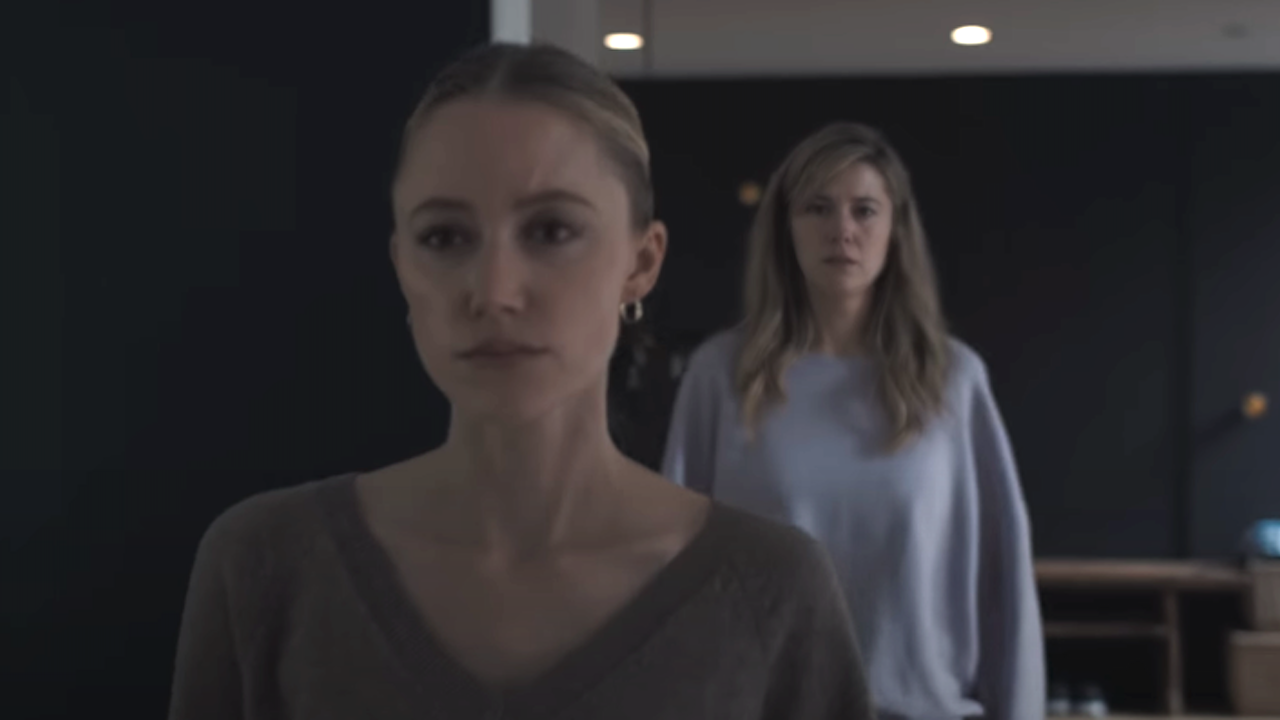SPOILERS are ahead for The Hand That Rocks The Cradle, which is new on streaming over on Hulu. Check out the movie before reading ahead.
Halloweekend is upon us, and a brand-new horror release called The Hand That Rocks The Cradle is here starring two seasoned actors in the genre, Maika Monroe and Mary Elizabeth Winstead. They’ve collaborated with acclaimed director Michelle Garza Cervera to bring a very twisty viewing experience about a mother and her mysterious babysitter. After I watched the new movie, I was left stunned by the ending. So when CinemaBlend had the chance to interview the creatives, I had to ask about the meaning behind it all.
The Director’s Thoughts On The Finale Of The Hand That Rocks The Cradle
The moment I had to ask the director about was regarding the final scene in the movie where Caitlin’s daughter Emma is sitting with her baby sister Josie and repeating the same story Polly once told her about her tragic time in foster care, when she at one time only ate tuna for sustenance. As Garza told me:
To me, it’s a very bittersweet ending. Now this family’s gonna be able to talk about what happened and to talk about Polly and her story is going to keep on going. It’s not like the antagonist passes away and that is gone. The trauma and violence kind of finds its way deep down, and everything that these girls went through, unfortunately there’s gonna be that past that their mom has in there, you know?
At the end of The Hand That Rocks The Cradle, we find out that Mary Elizabeth Winstead’s Caitlin committed arson to the house of Maika Monroe’s Polly when she was a teenager, killing Polly’s whole family before her eyes when she was just a child. Caitlin had done so in a desperate attempt to stop Polly’s father from continuing to sexually abuse her, and as Caitlin suggests at the end, Polly was being abused by him as well.
Since Caitlin’s children were exposed to Polly with her being their babysitter, they’ve absorbed some of the trauma associated with their mom’s past in their own way. As Garza continued in our interview:
I feel like that’s part of humanity – we can’t escape [the trauma]. It’s not like we can now have a happy family and happy life after what happened. There was so much pain back then and that is also part of life.
So Emma telling Josie Polly’s sad story about what being in foster care was like for her is the film’s way of helping bring home the message of how whatever trauma we may hold has a way of passing from one generation to the other, despite our best efforts.

Why Mary Elizabeth Winstead Thinks It’s The ‘Perfect’ Ending
When I continued the ending conversation with Maika Monroe and Mary Elizabeth Winstead, the actors echoed it had everything to do with “generational trauma.” Here’s what Winstead said specifically about Caitlin and Polly’s coming to a violent head at the end:
It sort of had to happen. So it’s almost like this poetic thing, even though it’s sort of violent and scary, but it’s very honest in that way . If we don’t deal with our past and our trauma things are gonna explode in a way that maybe we don’t want them to. So it feels like maybe a heightened version of that kind of a story, but in a way that also feels messy and real and truthful.
Winstead’s perspective on the story itself really adds some more layers to the effectiveness of the themes of The Hand That Rocks The Cradle. Polly can certainly be seen as a symbol of Caitlin’s trauma coming back to haunt her because she somewhat stuffed it down and didn’t deal with it. Winstead also said this:
I think it’s a perfect ending for the movie because it doesn’t feel triumphant in any way. It’s not like, ‘Oh, it’s all wrapped up in a bow and everybody’s okay now.’ It feels like I think in keeping with the movie as a whole, it feels very truthful and honest as to what likely would be the scenario. And that if this really happened and was really witnessed by a child that would be something that would be incredibly traumatic and if not dealt with properly, would be carried on throughout her life as well.
The movie is a remake of a movie of the same title from 1992. Our The Hand That Rocks The Cradle review gave it four out of five stars, applauding it for avoiding “a number of clichés” with its plotline and there being a “strength of the characters” especially when it comes to Monroe and Winstead’s performances. You can check out what other critics are saying about the movie, and look forward to the many other upcoming horror movies on the way as spooky season continues.
